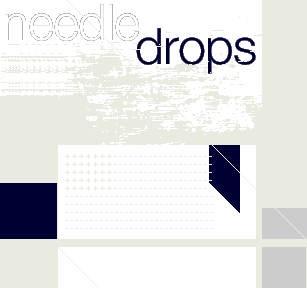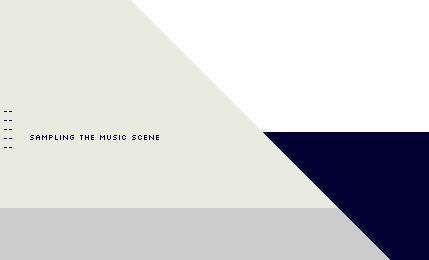


++ Contact Philip Sherburne ++
++ Recently ++
Tuesday, November 29, 2005 = The Stooges Unearthed (Again)
Tuesday, November 8, 2005 = Documenting Beulah And DCFC
Tuesday, November 1, 2005 = Out-Of-Control Rock 'N' Roll Is Alive And Well
Tuesday, October 25, 2005 = Just In Time For Halloween
Monday, October 3, 2005 = The Dandyesque Raunch Of Louis XI
Monday, August 15, 2005 = The Empire Blues
Tuesday, August 9, 2005 = David Howie's Sónar Diary
Monday, July 25, 2005 = Hot Sounds For Summertime
Monday, June 27, 2005 = Overcoming Writer's Block At Sónar 2005
Monday, June 4, 2005 = Cool New Sounds To Download Or Stream
++ Needle Drops Archives ++
View full list of Needle Drops articles...
|
|
 |
January 18, 2002
++ The Loyal Opposition
Last week I submitted my top 10 list for the Village Voice's annual Pazz & Jop poll, which tallies the year-end lists from hundreds of critics to compile a list of the year's top 100 records. There are two categories: albums and singles. Albums are a relatively simple affair, except for the way you have to weight your choices: you're given 100 points to divide among your 10 selections; no one record can receive more than 30 or fewer than 5 points. Singles are more straightforward, but the very category has its own hurdles: since singles no longer really exist, per se, the category is intended for radio "promo" tracks, the one or two or three tracks off an album that get added to radio playlists (Missy Elliott's "Get Ur Freak On," say). But for me, that's a big problem.
It's hard to judge the year in "pop" when you live outside the pop mainstream. I don't mean this as a matter of grand oppositionality — it's more a matter of habit. I don't have cable, so I don't watch music television (or, from what I understand of it, the four videos that constitute MTV's playlist at any given time); I don't drive, so I don't listen to the radio (and really, is there any other time you'd listen to the radio?). At home my hours are spent listening to records I have to review, or practicing DJing — and since I write primarily for electronic-music publications, and I DJ all variations of the umbrella genre tarred with the shrugworthy non-moniker "electronic music," there's precious little room in my aural diet for mainstream pop. When my colleagues on a music critics' mailing list talk about the dis war between Jay-Z and NaS, or a thread on the Velvet Rope debates the first-week sales of Mariah or Jacko, I'm left a bystander to the discussion.
I love popular music — except for the artiest, avant-gardiest of my musical diet, everything I listen to is "popular music" in the broadest sense. But what is "pop"? Pop is popular, not only in form (descended from blues, rock, and their many descendants) but in number. Pop sells. Most of my favorite albums — some of them albums I think are not only great but also important — only sell a few thousand copies. Given that the major labels of the Big 5 can't be bothered these days with an artist who has gold-record sales or less, can we even be talking about the same industry any more? And how can I call an album "important" if only a few thousand people are going to hear it?
Of course, punk was that way once; many of the most "important" punk bands out there were, by definition, resolutely DIY and sold records in the low thousands, or even the hundreds. Over time, of course, their reputations grew; their indie labels developed strong back-catalog sales, or sold out to majors; and the punkers ascended to the canon of popular music. While The Ramones achieved a respectable degree of success over their career, Nirvana are generally held up as the first band to break this cycle: they went from sales in the hundreds to the millions in just a few short years, and they changed the shape of popular music in the process. Or, perhaps, the shape of popular music changed around them.
This doesn't seem to be happening with electronic music; the names that break through to the charts, by and large, are no more or less derivative than any other dance-music artists out there; they simply have more crowd appeal. But they're not forging any grand new paradigms, and for that matter, neither is anyone else, really. Sure, Richard D James has spawned a wealth of imitators, as have Autechre, but I'm not really sure we could call them "important" — not in the Beatles/Bob Dylan/Rolling Stones sense, anyway. Even Boards of Canada, a sort of third-generation post-techno group, who have attained bona fide critics-darling status and are spawning their own hosts of imitators, aren't really "important." They make pleasant, even moving music, soaked in nostalgia and marked by skillful sound design. But that's the extent of their accomplishments.
No, it's true: dance music really isn't an artist's medium — or more precisely, it's not a personality-based medium. As much as I hate to acknowledge it, the critics have a point when they talk about "faceless techno." Except for pranksters like Aphex Twin and spotlight magnets like Moby, dance music producers are creatures of the studio and the DJ booth, not the stage and the talk show. The world of pop is one of recognition, of personality, of magazine covers and gossip and the flowering of enthusiasm. Dance music is a sociological phenomenon, a game of telephone, a sewing bee. And perhaps that's its saving grace.
++ Voting in Pazz & Jop is an odd, calculating affair (quite literally, given the point system); it is a second-guessing game where you tailor your tastes to score the maximum impact within the context of your colleagues'. I know, for instance, that folks like The Strokes and the White Stripes will come out on top. I'm not a fan of anyone that popular; I'd be a fool to think that any of my choices might even make the top 10. My goal is to choose savvily and load up my points so they'll add up with the points of another misfit critic who thinks like me — and then maybe we've got a shot of getting one of our oddball favorites in the pages of the Voice. The year-end poll is, like it or not, an exercise much like the electoral college, with the field mapped out in red and blue. I know I can't take California, so I'll settle for the likelier wins, symbolic but perhaps significant enough to ensure matching funding next year: Basement Jaxx will be my Massachusetts (they are, after all, a critics'-darling shoo-in), Björk my New York (another shoo-in), Chris Lee my Rhode Island. With luck, we'll place him in the bottom half of the list, given enough dark-horse-favoring critics like myself. I've chosen carefully, some would say cynically — everything I submit, even Fennesz and Herbert, stands a chance. Stuff like Domu or Stephan Mathieu I leave out, save for another list. Is that cynical? Well, yeah. But I still want to play the game, right?
For the singles list, more than a political strategist, I'm a Ralph Nader, serving mainly as gadfly. I don't listen to singles — not, in any case, radio singles, the songs other people know. I'd be hard pressed to name 10 current songs at all. I'm an album man, a remix man: I don't know from choruses. I know "choons" and tracks — and most of those I don't even know by name; I just know them by the color of the sleeve, the shape of the logo. I know the record when I see it, when the Maglite scrapes over it in the box below the decks. In the context of Pazz & Jop, my top 10 singles list might as well be a vote for the Intergalactic Brotherhood Party; it's a drop in the bucket that doesn't even splash. But somehow, knowing that it's futile doesn't make throwing my lot any less satisfying.
|
| |
|